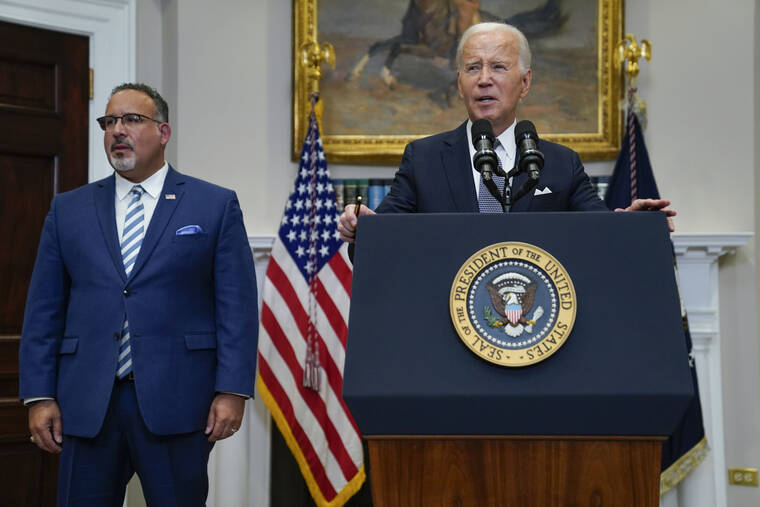Biden will talk about student debt relief in Wisconsin
WASHINGTON, D.C. — President Joe Biden is traveling to Wisconsin to announce details of a new plan to ease student loan debt for millions, a trip that comes a week after primary voting in the Midwest battleground highlighted weaknesses for the Democratic president and Donald Trump, his Republican challenger.
Biden was making the announcement Monday in Madison, the state’s liberal capital and home of the University of Wisconsin’s flagship campus.
The new federal rule paving the way for student debt relief is not expected to be issued by the time the president speaks, but Biden will highlight a plan the Department of Education started working on after the U.S. Supreme Court last year foiled his first attempt to forgive hundreds of billions of dollars in student loan debt.
Immediately after the court said Biden needed Congress to approve his original plan, the president said the decision was a “mistake” and “wrong” and announced that Education Secretary Miguel Cardona would undertake a new process using his authority under the Higher Education Act to waive or compromise student loan debt in specific cases.
A fresh announcement on student loan relief, an important issue for younger voters, could help energize parts of Biden’s political coalition that have become disillusioned by his job performance. These are people whose support the president will need to defeat Trump in November.
In Wisconsin’s primary elections on April 2, nearly 119,000 Republicans voted for a GOP candidate other than Trump, the party’s presumptive nominee. And more than 48,000 Democratic voters chose “uninstructed” instead of Biden, more than double Biden’s narrow margin of victory in Wisconsin in 2020.
Nearly 15% of Democrats in Dane County, home to the University of Wisconsin and Madison, voted “uninstructed.” That is nearly double the statewide total of 8%.
Democratic U.S. Rep. Mark Pocan, who represents Madison in Congress, said he was struck that concerns about Israel’s war against Hamas in Gaza were top of mind among voters at five town halls over the past two weeks in more rural parts of his district.
“I was surprised to see the intensity on the issue of Gaza coming not from a student voice out of Madison, but older voters in more rural parts of the district,” Pocan said.
Pocan said the number of “uninstructed” votes shows the concern in Wisconsin and that Biden needs to address it. He said he planned to talk directly with Biden about it on Monday.
“I just want to make sure he knows that if we’re going to have a problem, that could be the problem in Wisconsin,” Pocan said.
Biden’s new plan would expand federal student loan relief to new yet-targeted categories of borrowers through the Higher Education Act, which administration officials believe puts it on a stronger legal footing than the sweeping proposal that was killed by a 6-3 court majority last year.
The plan is expected to be smaller and more targeted than his original plan, which would have canceled up to $20,000 in loans for more than 40 million borrowers.
The department laid out five categories of borrowers who would be eligible to get some or all of their federal loans canceled. The plan is focused on helping those with the greatest need, including many who might otherwise never repay their loans.
Among those targeted for help are people whose unpaid interest has snowballed beyond the size of the original loan. The proposal would reset their balances back to the initial amount by erasing up to $10,000 or $20,000 in interest, depending on their income.
Borrowers paying down their student loans for decades would get all remaining debt erased under the plan. Loans used for a borrower’s undergraduate education would be canceled if they had been in repayment for at least 20 years. For other types of federal loans, it’s 25 years.
The plan would automatically cancel loans for those who were in for-profit college programs deemed “low-value.” Borrowers would be eligible for cancellation if, while they attended the college, the average federal student loan payment among graduates was too high in relation to their average salary.
Those who are eligible for other types of cancellation but haven’t applied would automatically get relief. It would apply to Public Service Loan Forgiveness and Borrower Defense to Repayment, programs that have been around for years but require infamously difficult paperwork.
Under pressure from advocates, the department also added a category for those facing “hardship.” It would offer cancellation to borrowers considered highly likely to be in default within two years. Additional borrowers would be eligible for relief under a wide-ranging definition of financial hardship.
A series of hearings to craft the rule wrapped up in February, and the draft is now under review. Before it can be finalized, the Education Department will need to issue a formal proposal and open it to a public comment period.
The latest attempt at cancellation joins other targeted initiatives, including those aimed at public service workers and low-income borrowers. Through those efforts, the Biden administration says it has canceled $144 billion in student loans for almost 4 million Americans.
Biden was stopping in Chicago for a campaign event before returning to the White House late Monday.
———
Associated Press writer Scott Bauer in Madison, Wisconsin, contributed to this report.

